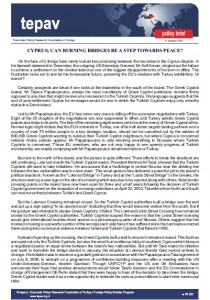On the face of it, things have rarely looked less promising between the two sides in the Cyprus dispute. In his farewell statement in December, the outgoing UN Secretary-General, Mr Kofi Annan, singled out the failure to achieve a settlement on the divided island as one of the biggest disappointments of his term in office. The frustration looks set to last for the foreseeable future, poisoning the EU’s relations with Turkey indefinitely. Or does it?
Certainly prospects are bleak if one looks at the leadership in the south of the island. The Greek Cypriot leader, Mr Tassos Papadopoulos, always the least conciliatory of Greek Cypriot politicians, remains firmly opposed to any deal that might involve any concession to the Turkish Cypriots. His language suggests that the sort of post-settlement Cyprus he envisages would be one in which the Turkish Cypriots enjoy only minority status in a Greek island.
Led by Mr Papadopoulos, the EU has come very close to killing off the accession negotiations with Turkey. Eight of the 35 chapters of the negotiations are now suspended in effect until Turkey admits Greek Cypriot planes and ships to its ports. The fate of the remaining eight seems yet to be at the mercy of Greek Cypriot whim. Normal logic might dictate that the EU s interests in Turkey, one of its half dozen largest trading partners and a country of over 70 million people in a key strategic location, should not be cancelled out by the wishes of 600,000 Greek Cypriots wanting to subdue their Turkish Cypriot neighbours, but where Cyprus is concerned rational choice seldom applies. Mr Papadopoulos is ably blocking everything in Brussels where Turkish Cypriots is concerned. Those EU members, who are not very happy to see speedy progress of Turkish membership, are readily complying with Mr Papadopoulos' derailment tactics onTurkey.
On the face of it, things have rarely looked less promising between the two sides in the Cyprus dispute. In his farewell statement in December, the outgoing UN Secretary-General, Mr Kofi Annan, singled out the failure to achieve a settlement on the divided island as one of the biggest disappointments of his term in office. The frustration looks set to last for the foreseeable future, poisoning the EU’s relations with Turkey indefinitely. Or does it?
Certainly prospects are bleak if one looks at the leadership in the south of the island. The Greek Cypriot leader, Mr Tassos Papadopoulos, always the least conciliatory of Greek Cypriot politicians, remains firmly opposed to any deal that might involve any concession to the Turkish Cypriots. His language suggests that the sort of post-settlement Cyprus he envisages would be one in which the Turkish Cypriots enjoy only minority status in a Greek island.
Led by Mr Papadopoulos, the EU has come very close to killing off the accession negotiations with Turkey. Eight of the 35 chapters of the negotiations are now suspended in effect until Turkey admits Greek Cypriot planes and ships to its ports. The fate of the remaining eight seems yet to be at the mercy of Greek Cypriot whim. Normal logic might dictate that the EU s interests in Turkey, one of its half dozen largest trading partners and a
country of over 70 million people in a key strategic location, should not be cancelled out by the wishes of 600,000 Greek Cypriots wanting to subdue their Turkish Cypriot neighbours, but where Cyprus is concerned rational choice seldom applies. Mr Papadopoulos is ably blocking everything in Brussels where Turkish Cypriots is concerned. Those EU members, who are not very happy to see speedy progress of Turkish membership, are readily complying with Mr Papadopoulos' derailment tactics onTurkey.
On the face of it, things have rarely looked less promising between the two sides in the Cyprus dispute. In his farewell statement in December, the outgoing UN Secretary-General, Mr Kofi Annan, singled out the failure to achieve a settlement on the divided island as one of the biggest disappointments of his term in office. The frustration looks set to last for the foreseeable future, poisoning the EU’s relations with Turkey indefinitely. Or does it?
Certainly prospects are bleak if one looks at the leadership in the south of the island. The Greek Cypriot leader, Mr Tassos Papadopoulos, always the least conciliatory of Greek Cypriot politicians, remains firmly opposed to any deal that might involve any concession to the Turkish Cypriots. His language suggests that the sort of post-settlement Cyprus he envisages would be one in which the Turkish Cypriots enjoy only minority status in a Greek island.
Led by Mr Papadopoulos, the EU has come very close to killing off the accession negotiations with Turkey. Eight of the 35 chapters of the negotiations are now suspended in effect until Turkey admits Greek Cypriot planes and ships to its ports. The fate of the remaining eight seems yet to be at the mercy of Greek Cypriot whim. Normal logic might dictate that the EU s interests in Turkey, one of its half dozen largest trading partners and a
country of over 70 million people in a key strategic location, should not be cancelled out by the wishes of 600,000 Greek Cypriots wanting to subdue their Turkish Cypriot neighbours, but where Cyprus is concerned rational choice seldom applies. Mr Papadopoulos is ably blocking everything in Brussels where Turkish Cypriots is concerned. Those EU members, who are not very happy to see speedy progress of Turkish membership, are readily complying with Mr Papadopoulos' derailment tactics onTurkey.
Tam metne ulaşmak için tıklayınız
(TEPAV Policy Brief, 31 Ocak 2007)

